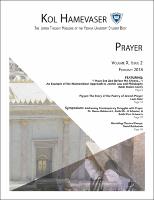Please use this identifier to cite or link to this item:
https://hdl.handle.net/20.500.12202/4412Full metadata record
| DC Field | Value | Language |
|---|---|---|
| dc.contributor.author | Yeshiva University Student Body | |
| dc.date.accessioned | 2019-06-18T13:47:41Z | |
| dc.date.available | 2019-06-18T13:47:41Z | |
| dc.date.issued | 2018-02 | |
| dc.identifier.citation | Kol Hamevaser : Prayer. (February 2018). 10(2). | en_US |
| dc.identifier.uri | http://kolhamevaser.com/wp-content/uploads/2019/01/11.2%20Prayer.pdf | en_US |
| dc.identifier.uri | https://hdl.handle.net/20.500.12202/4412 | |
| dc.description | student periodical | en_US |
| dc.description.abstract | This issue of Kol Hamevaser aims to create a space for dialogue about prayer within our community: about the meanings of Jewish liturgy and its laws, but also about the simple, personal, and dynamic ways in which our prayers move us, challenge us, and change us. In this issue, Ilan Lavian examines the Scriptural context of Birkat ha-Kohanim, and how this context changes our understanding of the blessing. Reuven Herzog explores the paradoxical nature of repentance through the story of Jonah, and his prayers. In an article on the Rambam’s HilkhotTefillah, Rabbi Shalom Carmy presents an analysis of the necessity of kavvanah in prayer, which has significant implications for the debate surrounding the original purpose of the Brisker method. Similarly, Rabbi Dr. Michael Rosensweig reveals the implications of Maimonides’ terminology in Hilkhot Teshuva by analyzing the talmudic source Maimonides draws from. In a symposium on the challenges of prayer, Dr. Deena Rabinovich, Rabbi Dr. J.J. Schacter, and Rabbi Ezra Schwartz discuss the role of prayer in our community, and how it can be a greater source of meaning in our lives. Finally, in our revisiting classical essays section, David Rubinstein revisits Rabbi Aharon Lichtenstein’s essay “Does Jewish Tradition Maintain an Ethic Independent of Halakha?”, explaining and further exploring its ideas. | en_US |
| dc.description.sponsorship | Bernard Revel Graduate School of Jewish Studies and the Yeshiva College Student Association (YCSA) | en_US |
| dc.language.iso | en_US | en_US |
| dc.publisher | Yeshiva University. | en_US |
| dc.relation.ispartofseries | Kol Hamevaser;10(2) | |
| dc.rights | Attribution-NonCommercial-NoDerivs 3.0 United States | * |
| dc.rights.uri | http://creativecommons.org/licenses/by-nc-nd/3.0/us/ | * |
| dc.subject | prayer | en_US |
| dc.subject | liturgy | en_US |
| dc.subject | Rabbi Shalom Carmy | en_US |
| dc.subject | piyyut | en_US |
| dc.subject | poetry of Jewish prayer | en_US |
| dc.subject | struggles with prayer | en_US |
| dc.subject | Birkat Ha-Kohanim | en_US |
| dc.subject | Rabbi Menahem Froman | en_US |
| dc.subject | Torat Ha-Sechok | en_US |
| dc.subject | Masekhet Hagigah | en_US |
| dc.subject | tefillah | en_US |
| dc.subject | personalized prayer | en_US |
| dc.subject | Rabbi Aharon Lichtenstein | en_US |
| dc.subject | Does Jewish Tradition Recognize an Ethic Independant of Halakha? | en_US |
| dc.title | Kol Hamevaser ; February 2018 | en_US |
| dc.title.alternative | The Jewish Thought Magazine of the Yeshiva University Student Body | en_US |
| dc.type | Journal | en_US |
| Appears in Collections: | Kol Hamevaser | |
Files in This Item:
| File | Description | Size | Format | |
|---|---|---|---|---|
| Kol Hamevaser 11.2 Prayer.pdf | PDF from website | 2.48 MB | Adobe PDF |  View/Open |
This item is licensed under a Creative Commons License

